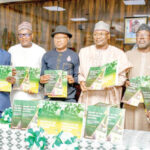A credible register of voters is the superstructure on which transparent and acceptable elections are anchored. The framers of our constitution recognised this axiom in lucidly setting out the muscular mandate of the Independent National Electoral Commission (INEC).
The Electoral Act 2022, drawing its afflatus and strength from the Constitution further elucidates in Section 9(1): “The Commission shall compile, maintain and update, on a continuous basis, a National Register of Voters, in this Act referred to as the (“Register of Voters”) which shall include the names of all persons entitled to vote in any Federal, State or Local Government or Area Council elections”.
- Soldier kills fuel attendant in Niger
- Lull in ministries as Buhari yet to replace Amaechi, Onu, others
Section 10(1) of the Act reinforces this and further expatiates that: “Without prejudice to Section 9(5), there shall be continuous registration of all persons qualified to be registered voters.”
Encumbered by resources – human and financial – and bereft of the will, INEC, had until 2017 been deliberately observing these two salient sections partially. Continuous Voter Registration (CVR) in time past, was done for a brief period and usually before the conduct of general or off cycle elections due to paucity of funds and the personnel to conduct the exercise. As a prelude to 2017, the Commission, in 2013, recruited Registration Area Officers (RAOs) for the 8,809 Wards or Registration Area Centres (RACs) strewn across the country. Most of the RAOs were computer savvy and were trained to register prospective or eligible voters at the Ward level.
It was not until 2017, under the watch of Professor Mahmood Yakubu, that the Commission summoned the will and courage to conduct voter registration on a continuous basis as contemplated by our extant laws. On Thursday, April 27, 2017, the Continuous Voter Registration (CVR) exercise was flagged off in the Federal Capital Territory (FCT) and all the states of the federation. The CVR exercise proceeded apace until a few months to the conduct of the 2019 General Elections. The CVR exercise provided an opportunity for millions of Nigerians to register to vote. It also made it possible to contain 84,004,084 registrants ahead of the elections.
By the same token, the Commission on Monday, June 28, 2021, flagged off the CVR with an ambitious projection of taking the register to contain at least 100 million voters. Moving in tandem with technology, the Commission deployed, for the first time in its annals, the novelty of on-line preliminary registration to complement and augment the physical or in-person registration. And taking into cognisance the heightened insecurity in the country, it started with the on-line registration and eventually devolved to physical registration from the state and local government area levels to the wards where most of our people reside. The Commission had planned the CVR exercise to come to a close on June 30, 2022 to enable it to do its housekeeping ahead of the 2023 General Elections, namely: to clean the register of multiple registrants, print the Permanent Voter Cards (PVCs) and distribute them.
But if INEC’s plans for the CVR exercise were well laid, articulated robustly and publicised with gusto, there are issues which the Commission must reckon with, including the prospects of an extension beyond June 30.
First, due to heightened insecurity in some jurisdictions across the country, some eligible voters have not been able to register. Given the serial attacks on INEC personnel and its assets, before and during the CVR exercise in some parts of the country, INEC itself has had to exercise circumspection in order not to put its staff and registrants in harm’s way. As the security situation improves in some of these areas and with the support of stakeholders and security agencies, INEC should resume registration in such hitherto violence-prone areas.
Second, the increased transparency of INEC’s processes, the introduction of technology, which is supported by Electoral Act 2022, and which enjoins the Commission to use technology as appropriate to enhance the electoral process, have in turn invested Nigerians with the confidence that the elections will be more wholesome and that their votes will ultimately count. Apart from these developments which have buoyed their confidence, they have strengthened the resolve of Nigerians to vote.
Third, the resolve of more Nigerians to register in order to vote has been fortified and spurred by the recently conducted party primaries. The challenges, for good or ill, thrown up by the primaries and their outcomes, particularly the calibre of the standard-bearers, appear to galvanise Nigerians to register.
Fourth, the clamour for an extension of the CVR exercise is informed and epitomised by the huge crowds that inundate the registration centres. Though this surge speaks to our tendency to attend to serious matters only tardily at the eleventh hour, it seems clear to me that there is a re-awakening, a progressive, salutary re-awakening, especially on the part of our youths. Our youths appear to be coming to terms with the fact that finding recourse to the social media to express their angst at politicians is counter-productive and to bring about a healthy reset and an uplifting re-direction of our affairs is to register in order to vote. INEC should give full expression to this positive re-awakening.
Fifth, the more Nigerians register to vote, the merrier. Not only will they meet or surpass INEC’s projection of 100 million voters, ours shall be a huge and highly participatory democracy. In addition, whoever emerges victorious at the end of the day would have secured a mandate robustly given by the Nigerian people.
One appreciates that the CVR exercise cannot continue interminably and that an extension, as canvassed by this humble writer and millions of Nigerians, must be informed by INEC’s housekeeping, aforementioned, its budget and our extant laws. All the same, the case for an extension of the CVR exercise is both cogent and compelling.
By Nick Dazang, who is a former Director at the Independent National Electoral Commission (INEC).

 Join Daily Trust WhatsApp Community For Quick Access To News and Happenings Around You.
Join Daily Trust WhatsApp Community For Quick Access To News and Happenings Around You.


